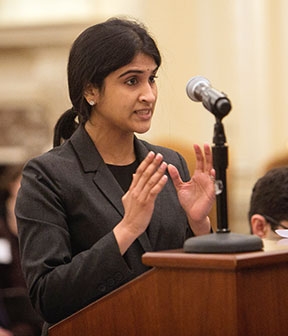Students examine Fourth Amendment issues in digital age at Marden Moot Court Competition
This year’s Orison S. Marden Moot Court Competition, an annual competition highlighting an unsettled area of the law, focused a digital lens on an enduring constitutional issue: illegal search and seizure. The case, United States of America v. Joe Malone, was focused on two questions about the search and seizure of digital property.
The moot problem, authored by Tamara Cesaretti ’18 and Esther Choi ’18 with assistance from NYU Law adjunct professors Zachary Goldman ’09 and Andrew Schaffer, imagined an individual involved in the online black market for drug transactions. In this scenario, the FBI used an “exploit” code to investigate the computer and retrieve incriminating files as evidence. Students had two questions to examine: first, whether the defendant has the right to review classified code as discovery under the Brady Rule, which requires prosecutors to turn over all exculpatory evidence in pretrial discovery in a criminal case, and second, whether the accidental removal of legitimate computer files violates the Fourth Amendment and renders the evidence inadmissible.
The Marden Competition is held every year in two rounds. In the first round, during the fall, students write a brief on one side of a hypothetical appeal before the US Supreme Court. They must then argue for or against their position before panels of judges in October. This past fall, Albert Podell Award recipients included Gabriel Panek ’17, for Best Oral Advocate; Jennifer Graber ’17, for Best Brief Writer; and Jason Driscoll ’18, for the Moot Court Board Advocacy Award.
The second round—semifinals and finals—is held in the spring. In the semifinals, the finalists from the fall competition argue a two-question Supreme Court moot court problem in teams, with the top four finalists proceeding to the finals.
This year, Tyler Domino ’17, Dan Peck ’17, Caleb Seeley ’17, and Mathura Sridharan ’18 advanced to the finals and presented arguments for a bench that consisted of Judge Bernice Donald of the US Court of Appeals for the Sixth Circuit and Judge Robert Sack of the US Court of Appeals for the Second Circuit. Sridharan took home the competition’s top award for Best Oral Advocate, as well as the award for Best Brief Writer.
Posted April 13, 2017


